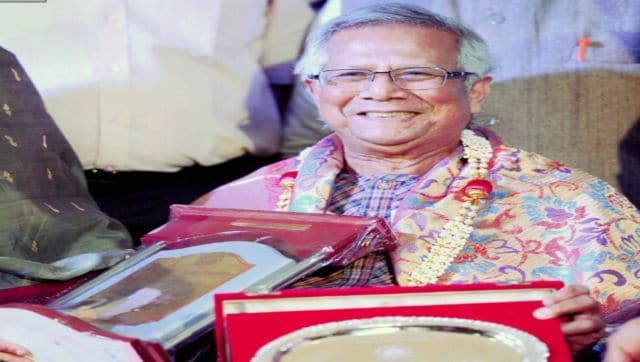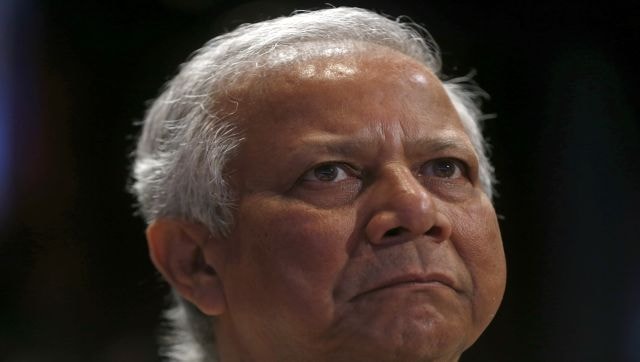Muhammad Yunus, a Nobel laureate and founder of Grameen Bank, was sentenced to six months in jail by a Bangladeshi court on Monday over alleged labour law violations. Yunus and three of his colleagues, including Grameen Telecom director and former managing director Md Ashraful Hasan and board of directors’ members Nur Jahan Begum and Md Shahjahan, were found guilty and
sentenced to six months in jail
by Dhaka labour court judge Sheikh Merina Sultana. The charges against Yunus, who had shown political aspirations in the past, and the others include failures to distribute five per cent of the company’s net profit among workers as stipulated by Bangladeshi law, regularise 101 staff members, and compensate workers for public holidays. All four have denied
the charges
and the case has been criticised as politically motivated by watchdogs, including Amnesty International. “I have been punished for a crime that I haven’t committed,” Yunus told reporters after the hearing. “If you want to call it justice, you can,” the Guardian reports him saying. “This verdict is unprecedented,” said Abdullah Al Mamun, a lawyer for Yunus. “We did not get justice.” Khaja Tanvir, another of his lawyers, called the case “meritless, false, and ill-motivated.” He went on to say: “The sole aim of the case is to harass and humiliate him in front of the world.” Here’s all about Muhammad Yunus and how the Nobel-winning microfinance pioneer, who is celebrated around the world for helping millions of people out of poverty, is facing legal challenges in his home country Bangladesh. From Nobel Peace Prize to ongoing struggles for social change The 83-year-old, known as the “banker to the poorest of the poor”, was awarded the Peace Prize in 2006 for his work loaning small cash sums to rural women, allowing them to invest in farm tools or business equipment and boost their earnings. Grameen Bank, the microfinance lender he founded, was lauded for helping unleash breakneck economic growth in Bangladesh, and its work has since been copied by scores of developing countries. “Human beings are not born to suffer the misery of hunger and poverty,” Yunus said during his Nobel lecture, daring his audience to imagine a world where deprivation was confined to history museums. But his public profile in Bangladesh has earned him the hostility of Prime Minister Sheikh Hasina, who once accused him of “sucking blood” from the poor. Yunus still faces more than 100 other charges on alleged graft and labour law violations. Hasina’s administration has been increasingly cracked down on political dissent, and Yunus’s popularity has for years earmarked him as a potential rival. [caption id=“attachment_13566032” align=“alignnone” width=“640”] Yunus has won numerous high honours for his life’s work, including a US Presidential Medal of Freedom awarded by Barack Obama. File image/PTI.[/caption] The year after winning the Nobel Prize, Yunus announced plans to set up his own “Citizen Power” party to end Bangladesh’s confrontational political culture, which has been punctuated by instability and periods of military rule. He abandoned those ambitions within months, but the enmity aroused by his challenge to the ruling elite has persisted. Since Hasina returned to power in 2008, Yunus has been hit with a series of criminal cases and a smear campaign by a state-led Islamic agency that accuses him of promoting homosexuality. The government unceremoniously forced him out of Grameen Bank in 2011 — a decision fought by Yunus but upheld by Bangladesh’s top court. A telecom firm he chairs was hit with a graft probe in 2022 over accusations it had embezzled employee funds — claims that critics say are politically motivated. Hasina also blamed Yunus for the World Bank’s decision to cancel funding for a bridge near the capital Dhaka after the project was embroiled in a bribery scandal. The bridge finally opened in 2022 after years of construction delays, and at its opening ceremony, Hasina said Yunus should be “dipped in the river” for jeopardising its completion. Yunus has adamantly denied influencing the World Bank’s decision and his office has described the claims as “purely imaginary”. ‘Poverty was all around me’ Yunus was born into a well-to-do family — his father was a successful goldsmith — in the coastal city of Chittagong in 1940. He credits his mother, who offered help to anyone in need who knocked on their door, as his biggest influence. [caption id=“attachment_13566052” align=“alignnone” width=“640”]
Yunus has won numerous high honours for his life’s work, including a US Presidential Medal of Freedom awarded by Barack Obama. File image/PTI.[/caption] The year after winning the Nobel Prize, Yunus announced plans to set up his own “Citizen Power” party to end Bangladesh’s confrontational political culture, which has been punctuated by instability and periods of military rule. He abandoned those ambitions within months, but the enmity aroused by his challenge to the ruling elite has persisted. Since Hasina returned to power in 2008, Yunus has been hit with a series of criminal cases and a smear campaign by a state-led Islamic agency that accuses him of promoting homosexuality. The government unceremoniously forced him out of Grameen Bank in 2011 — a decision fought by Yunus but upheld by Bangladesh’s top court. A telecom firm he chairs was hit with a graft probe in 2022 over accusations it had embezzled employee funds — claims that critics say are politically motivated. Hasina also blamed Yunus for the World Bank’s decision to cancel funding for a bridge near the capital Dhaka after the project was embroiled in a bribery scandal. The bridge finally opened in 2022 after years of construction delays, and at its opening ceremony, Hasina said Yunus should be “dipped in the river” for jeopardising its completion. Yunus has adamantly denied influencing the World Bank’s decision and his office has described the claims as “purely imaginary”. ‘Poverty was all around me’ Yunus was born into a well-to-do family — his father was a successful goldsmith — in the coastal city of Chittagong in 1940. He credits his mother, who offered help to anyone in need who knocked on their door, as his biggest influence. [caption id=“attachment_13566052” align=“alignnone” width=“640”] Since Hasina returned to power in 2008, Yunus has been hit with a series of criminal cases and a smear campaign by a state-led Islamic agency that accuses him of promoting homosexuality. File image/AP[/caption] Yunus won a Fulbright scholarship to study in the United States and returned soon after Bangladesh won its independence from Pakistan in a brutal 1971 war. When he returned, he was chosen to head Chittagong University’s economics department, but the young country was struggling through a severe famine and he felt compelled to take practical action. “Poverty was all around me, and I could not turn away from it,” he said in 2006. “I found it difficult to teach elegant theories of economics in the university classroom… I wanted to do something immediate to help people around me.” After years of experimenting with ways to provide credit for people too poor to qualify for traditional bank loans, he founded Grameen Bank in 1983. The institution now has more than nine million clients on its books, according to its most recent annual report (2020), and over 97 per cent of its borrowers are women. Yunus has won numerous high honours for his life’s work, including a US Presidential Medal of Freedom awarded by Barack Obama. With inputs from AFP.
Since Hasina returned to power in 2008, Yunus has been hit with a series of criminal cases and a smear campaign by a state-led Islamic agency that accuses him of promoting homosexuality. File image/AP[/caption] Yunus won a Fulbright scholarship to study in the United States and returned soon after Bangladesh won its independence from Pakistan in a brutal 1971 war. When he returned, he was chosen to head Chittagong University’s economics department, but the young country was struggling through a severe famine and he felt compelled to take practical action. “Poverty was all around me, and I could not turn away from it,” he said in 2006. “I found it difficult to teach elegant theories of economics in the university classroom… I wanted to do something immediate to help people around me.” After years of experimenting with ways to provide credit for people too poor to qualify for traditional bank loans, he founded Grameen Bank in 1983. The institution now has more than nine million clients on its books, according to its most recent annual report (2020), and over 97 per cent of its borrowers are women. Yunus has won numerous high honours for his life’s work, including a US Presidential Medal of Freedom awarded by Barack Obama. With inputs from AFP.
Why has Nobel laureate Muhammad Yunus been sentenced to 6 months in jail in Bangladesh?
FP Explainers
• January 2, 2024, 10:22:53 IST
Nobel laureate and founder of Grameen Bank, Muhammad Yunus, has been sentenced to six months in jail by a Bangladeshi court on Monday over alleged labour law violations, along with his three coworkers. His supporters, however, claim that the case is politically motivated
Advertisement
)